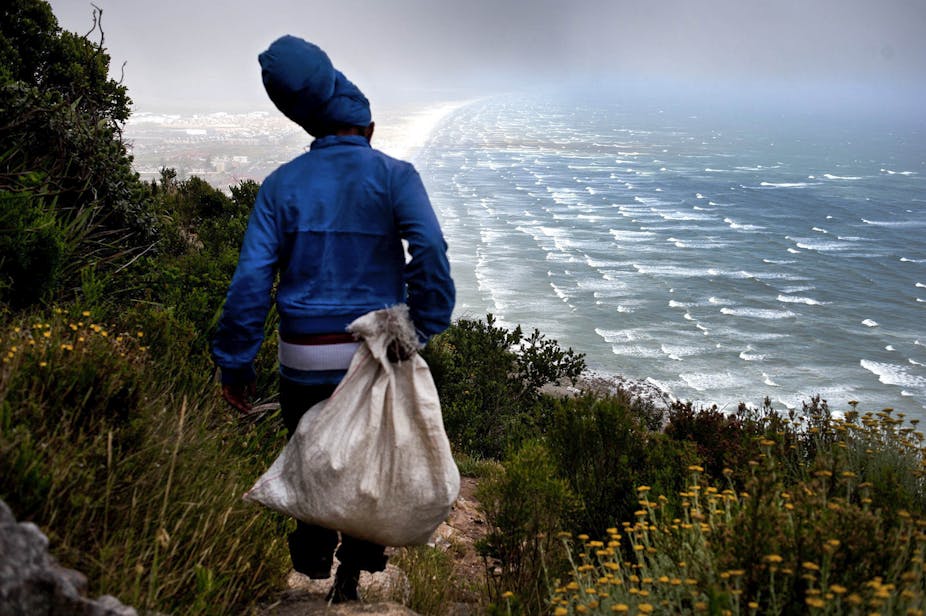The marketplace of Bellville in Cape Town is an unlikely place to find an example of everyday multilingual diversity applied in an ethical way. But you have to keep your ears peeled as you pass from stall to stall, move through the bus and taxi terminus, and then through the train station area. Otherwise you may miss the calls of this Rastafarian multilingualism.
Listen carefully:
Fresh Herbs! Fresh Herbs! Zonke Amayeza (All the herbs)!
It is Jeremy (not his real name), a Rastafarian pointing to a passerby as he is calling out the names of his herbal products in three distinct languages, English, Afrikaans and isiXhosa, in the subway tunnel.
In my research I’ve found that Jeremy is not an isolated example – Rastafarian multilingualism is widespread across Cape Town. Rastafarians come from diverse cultural, racial and ethnic backgrounds and are therefore more open to multilingualism.
Kykie, Tjommie (look here, buddy)! Higher Grade? Hierso (right here)! Zuka gaba (Herbs for vomiting)! High blood pressure!
Ethical multilingualism is about the mutual respect and about the acknowledgement of linguistic difference. More importantly, it’s about shaping a shared multilingual future through face-to-face communication.
In many respects, Rastafarian multilingualism is about achieving common ground in multilingual interactions, but shot through with the ethical principles of Rastafarianism. In communication with their customers and others, Rastafarians approach interaction with respect. They see their interlocutors as fully human rather than as socially flawed categories. They draw on the theology of Rastafarianism to demonstrate that they too are human.
They draw on the morals and virtues taught in the Rastafarian Bible, called the Holy Piby, that is transmitted through oral literacy, as well as draw on the belief system preached by Haile Selassie (the messiah of the Rasta).
Travelling herbs
On a daily basis, you’ll find Jeremy, seated on the floor beside a mat with an array of herbs. They’re for the stomach, hair, skin or recreation. He’s broadcasting information about the herbs: How much they cost, their purpose and where they come from.
Jeremy’s herbs have travelled far – from the coastal area of Knysna about 500 km away, or the mountains of Cape Town and surrounding farms. And much like the mobility of his herbal products Jeremy’s multilingualism is defined by learning the sounds, words and sentences of other languages to call out and sell his products.
His type of multilingualism is defined by his mobility. He moves around a lot and meets people from all walks of life and races. And he has honed his multilingualism to deal with multilingual diversity in everyday interactions.
Historically, the Rastafarian community in South Africa has been at the forefront of engaging multilingual diversity in an ethical way. Rastafarian culture and religion is rooted in the principles and beliefs of the last Ethiopian Emperor, Haile Selassie and the pan-Africanist philosophy of Marcus Garvey. It is a belief system often viewed as religious as well as political, contributing, for example, to South Africa’s liberation movements and the fight against apartheid. And all the principles and beliefs are found in the lyrics, rhythms and poetry of reggae music.
Linguistically interesting
Take this encounter: Jeremy is attempting to explain the meaning and purpose of a herb with an isiXhosa name to a black female customer. She clearly speaks isiXhosa and English and asks for a particular herb. Jeremy picks up a herb and draws a circle movement around his face. He explains:
Yes, that one is good for the face: Nonqwe (an indigenous herb).
And then it gets interesting, linguistically.
He tells the customer that actually a different herb, pointing to it, is better for her. He picks up the herb, calls it by its isiXhosa name, “Xamangvela”. The confused look on the customer’s face lets him know he just mispronounced the lateral click, “x”, as his tongue gets stuck on the left side of his mouth.
He panics phonetically, and tries again. This time he pronounces the herb employing the dental click, “c”, saying “Camangvela”. But it sounds a bit too English and his tongue gets stuck onto his palate. His face says it all and the reply by the customer, “Sorry?”, as though he offended her linguistically, begins to injure the politeness of the interaction.
He tries again for the last time but spectacularly mispronounces the name of the herb in “Kaaps” (Cape Afrikaans):
Kamangvel.
There is a slight pause and the customer decides to buy the Nonqwe.
This multilingualism is not a display of struggling to pronounce a particular word correctly. Rather it’s how to sustain multilingual interaction in a space filled with multilingual sounds and based on mutual linguistic respect. And of course, it’s based on the successful sale of a herb. For Jeremy, and others like him, those factors underline this definition of Rastafarian multilingualism.
Depending on the topic of conversation, Rastafarians will also add a localised version of Jamaican creole. They use words such as “Ihi yahnh Ihi” or “Ini” (meaning I and I, we, or you and I), “Jah” (God), “Iya” (my brother) and so on. And they will mix that creole with Kaaps, English, Sabela (prison gang language), Tsotsi taal (a mix of Afrikaans, English and other indigenous languages), isiZulu, and as Jeremy has shown, isiXhosa.
Jeremy’s multilingual practice is an example of this inclusive multilingual diversity where language and speech styles are shared. And, the multilingual calls of the Rastafarians come with an extra helping of ethics.

